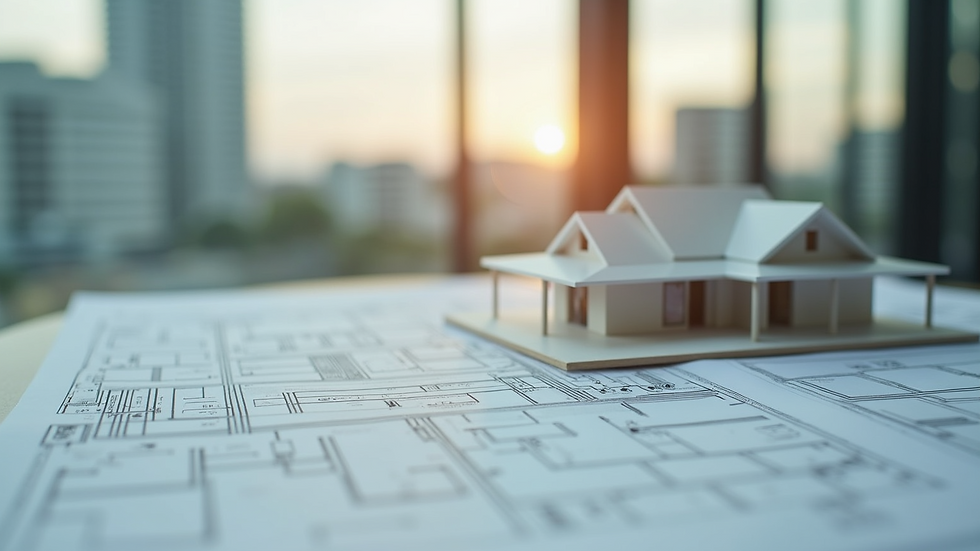Property Development Processes: Enhance Your Projects with Expert Development Services
- NEWS

- Sep 2, 2025
- 4 min read
Updated: Nov 7, 2025
When it comes to turning a vision into a thriving real estate project, understanding the right steps and having expert support can make all the difference. Whether you are looking to invest in property, find short-term accommodation, or buy a home, knowing how property development processes work can help you make smarter decisions. I want to share insights that will guide you through these processes and show how expert development services can enhance your projects.
Understanding Property Development Processes
Property development processes involve a series of planned steps that transform land or existing buildings into valuable real estate assets. These steps are essential to ensure that projects are completed on time, within budget, and meet the needs of future occupants or investors.
Here’s a simple breakdown of the key stages:
Site Selection and Acquisition
Finding the right location is crucial. This involves researching areas with growth potential, accessibility, and demand. Once a site is identified, negotiations and legal checks follow to secure ownership.
Feasibility Study and Planning
This stage assesses whether the project is financially and legally viable. It includes market analysis, cost estimation, and obtaining necessary planning permissions from local authorities.
Design and Development
Architects and planners create detailed designs that meet regulations and client needs. This phase also involves selecting contractors and suppliers.
Construction
The physical building process begins here. Regular monitoring ensures quality and adherence to timelines.
Marketing and Sales or Leasing
Once the project nears completion, marketing strategies attract buyers or tenants. This step is vital for generating returns on investment.
Management and Maintenance
After occupancy, ongoing management keeps the property in good condition and maintains its value.
Each of these steps requires careful coordination and expertise to avoid costly mistakes and delays.

Why Following Property Development Processes Matters
Skipping or rushing through any stage can lead to problems like legal issues, budget overruns, or poor-quality construction. By following a structured process, you can:
Reduce Risks: Proper planning helps identify potential challenges early.
Maximise Returns: Efficient development increases property value and rental income.
Ensure Compliance: Meeting legal and environmental standards avoids fines and delays.
Improve Quality: Careful design and construction lead to better living spaces.
For example, a well-conducted feasibility study might reveal that a site is better suited for apartments rather than commercial units, saving time and money in the long run.
What is the Meaning of Property Development?
Property development is the process of improving land or buildings to create new or enhanced real estate assets. It involves everything from buying land, designing buildings, constructing them, and finally selling or renting the finished product.
At its core, property development is about adding value. This can mean building new homes, converting old warehouses into trendy apartments, or upgrading commercial spaces to attract better tenants.
The process requires a mix of skills, including finance, design, construction, and marketing. Successful developers balance these elements to deliver projects that meet market demand and generate profits.

How Expert Development Services Can Boost Your Project
Navigating property development processes can be complex. That’s where expert development services come in. These professionals bring experience, knowledge, and connections that help streamline every stage.
Here’s how expert services can enhance your project:
Strategic Planning: Experts help identify the best sites and development types based on market trends.
Regulatory Guidance: They manage planning applications and ensure compliance with local laws.
Project Management: Coordinating contractors, suppliers, and timelines to keep the project on track.
Financial Oversight: Budgeting and cost control to maximise investment returns.
Marketing Support: Crafting effective campaigns to attract buyers or tenants quickly.
For instance, working with a team like property development services can provide you with tailored advice and hands-on support, reducing stress and increasing your chances of success.

Practical Tips for Engaging with Property Development Projects
If you’re considering getting involved in property development, here are some actionable tips to keep in mind:
Do Your Homework: Research the local market thoroughly. Understand what types of properties are in demand.
Set Clear Goals: Define what you want to achieve - whether it’s capital growth, rental income, or quick resale.
Choose the Right Partners: Work with experienced developers, architects, and legal advisors.
Stay Involved: Regularly check progress and communicate with your team.
Plan for Contingencies: Have a buffer in your budget and timeline for unexpected issues.
Focus on Quality: Don’t cut corners on materials or workmanship; it pays off in the long term.
By following these tips, you can make your property development journey smoother and more rewarding.
Looking Ahead: Growing Your Property Portfolio
Once you’ve completed your first project, you might want to expand your portfolio. The key is to apply the lessons learned and continue working with trusted experts. Diversifying locations and property types can also reduce risk and increase opportunities.
Remember, property development is a long-term game. Patience, planning, and professional support are your best allies. With the right approach, you can build a strong portfolio that delivers steady returns and meets your lifestyle needs.
I hope this guide helps you feel more confident about property development processes and the value of expert support. Whether you’re investing, buying, or renting, understanding these steps will empower you to make better choices and enjoy the benefits of well-developed properties.



